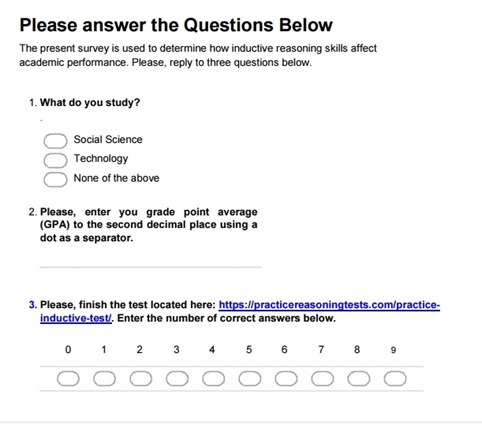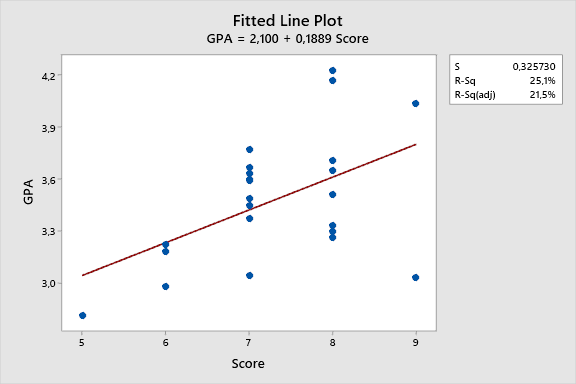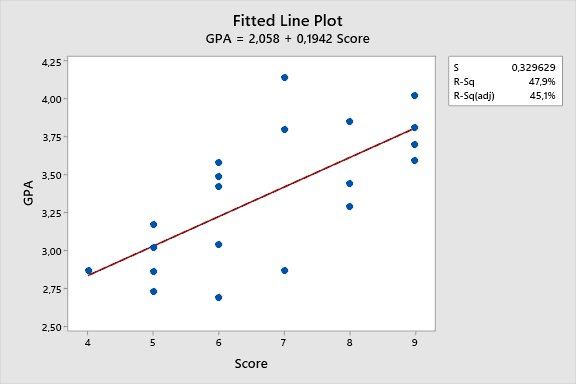Abstract
The importance of inductive reasoning skills (IRS) for academic performance a topic of increased interest for the international community of researchers in education. The literature review suggests that inductive reasoning can positively affect the grade point average (GPA) of students of different age groups. However, the current body of research lacks information if such skills are more important in some studies than in others. The present project compares the results of the regression analysis of GPA versus IRS of students studying social sciences and technology students. The results demonstrate that IRS is more important for technology students; however, the results need further confirmation due to limitations of the present research.
Introduction
The importance of inductive reasoning skills (IRS) for the academic achievements of students is a highly discussed topic in scientific and academic literature. Inductive reasoning is commonly defined as being able to make predictions base on existing knowledge (Hayes & Heit, 2017). IRS, along with other reasoning abilities, including deductive reasoning, linear reasoning, conditional reasoning, cause-and-effect reasoning, and analogical reasoning, can predict the academic achievement of students (Bhat, 2016). However, it is unclear if the IRS has a varying effect on the academic achievements of students in different fields. Therefore, the goal of the present paper is to identify whether IRS is more important in some studies than in others. In particular, the matter of interest is whether there is a significant difference in the effect that the IRS has on the academic performance of technology and social science students. The study is guided by three research questions listed below.
- Question 1: What is the effect of the IRS on the academic performance of technology students?
- Question 2: What is the effect of the IRS on the academic performance of students studying social sciences?
- Question 3: Is there a significant difference between the effects of the IRS on the academic performance of students studying technology and social sciences?
Since IRS can be trained, the importance of the present research is self-evident. The findings of the present research are expected to support recommendations for students in different fields to improve their academic performance. Moreover, the study can help to create education programs designed specifically for students majoring in technology or social sciences. In other words, the findings of the present paper are beneficial for both learners and educators.
Literature Review
IRS is a topic of increased interest in the current scientific and academic literature. Bhat (2016) studied a sample of 598 of the age group 16-17 years to define the correlation between reasoning abilities and academic performance of students. The study utilizes regression analysis to analyze academic performance against IRS, deductive, linear, conditional, cause-and-effect, and analogical reasoning.
The results show that deductive and cause-and-effect reasoning have the most significant effect on academic performance (Bhat, 2016). However, the results of the research demonstrate that the IRS also has a statistically significant effect on grade point average (GPA) with adjusted R2 = 0.16. The results of the study are valid and reliable since the researcher use appropriate methods that were assessed multiple times. The article by Bhat (2016) is relevant for the present research since it confirms that IRS is crucial for improving academic performance.
The study by Kamelifar (2017) discusses the effect of the IRS on the academic achievement of Iranian foreign language learners. The research studies a sample of 92 female students aged between 18 and 24. The result of the experiment demonstrates that the IRS is positively correlated with the ability to learn foreign languages, and improving IRS can boost academic performance in language studies. Even though the sample size is limited, the research results are relevant for the present paper since they show that IRS is vital for students studying social sciences.
Similarly, Sorensen et al. (2016) claim that IRS is of extreme importance for environmental and socio-scientific studies. The research claims that social scientists “are much more likely to approach a novel research question using inductive reasoning” (Sorensen et al., 2016, p. 291). Social scientists start with observing a large amount of data without a particular model or hypothesis in mind and use IRS to generalize the knowledge into a hypothesis and apply it to predict outcomes (Sorensen et al., 2016). While the research does not provide significant experimental proof, the provided expert opinion is also relevant for the present paper.
Reasoning abilities, including IRS, are also crucial for technology students. Vilia, Candeias, Neto, Franco, and Melo (2017) study a sample of 470 Portuguese students to confirm that IRS, along with other reasoning abilities, can predict the academic achievements of physics and chemistry students. The researchers conclude that 48% of changes in academic performance can be explained by differences in reasoning abilities (Vilia et al., 2017). Even though it is unclear precisely how much does IRS impacts the performance of technology students, the results are still relevant for the present paper.
Buckley, Seery, Canty, and Gumaelius (2018) conducted thorough qualitative research to assess the importance of the IRS for technology students. The study concludes that “developing cognitive abilities should arguably become a fundamental aim of technology education” (Buckley et al., 2018, p. 207). Among the mentioned cognitive abilities, IRS is considered crucial since it helps the technology students to generalize their knowledge, create models, and apply them to predict future results (Buckley et al., 2018). In particular, 45.3% of changes in the academic performance of technology students can be explained by the differences in IRS (Buckley et al., 2018). The results are vital for the present paper for referential purposes.
Methods
The research aimed at creating a model for predicting academic performance with the IRS. The literature review revealed that the most effective method for addressing the issue is to use regression analysis using an adequate sample. Therefore, the present research aimed at gathering a sufficient amount of data concerning academic performance and IRS of both technology and social science students. The research needed to measure student’s performance and the IRS. The statistical analysis was performed using Minitab 19.
The primary construct of the research is the IRS, which is a relatively abstract idea. According to Hayes and Heit (2017), inductive reasoning is the ability to make “predictions about novel objects or situations based on existing knowledge” (p. 1). There are six dimensions of inductive reasoning, including causal inference, prediction, generalization, the argument from authority, the argument from signs, and analogy (Kuehn, n.d.).
There is no universal method to measure the IRS; however, it is usually estimated using an inductive reasoning test. Even though there are numerous authoritative tests to measure the IRS, one of the primary concerns was to make the test concise and appropriate for the sample. It was identified that a nine-item questionnaire adopted from the Practice Reasoning (n.d.) website is applicable for the research design. The indicator for the construct is the self-reported score in the test ranging from 0 to 9. The second construct is academic performance, which is measured using GPA in all of the reviewed literature. An indicator is a self-reported number between 0 and 5.
In order to gather the needed data, a questionnaire in Google Forms was created, which included six questions. For Question 1, the participants were asked to state whether they were studying social science, technology, or none of the above. The respondents who marked the third option were not included in the data analysis. For Question 2, the students were asked to state their current GPA to the second decimal place using a dot as a separator.
For Question 3, the respondents were asked to take the test for inductive reasoning skills and enter the number of correct answers. The survey can be viewed below. The questionnaire was distributed via Facebook among 50 students studying in higher education institutions, and 44 replies were considered valid. The dataset can be seen in Table 1. The participants were asked to complete the questionnaire within one week.

Table 1. Dataset.
Results
The replies were divided into two groups for students studying social science and technology. The results for the regression analysis of GPA versus IRS test scores for social science students are represented in Figure 1 below. According to the results, 21.5% of differences in GPA can be explained by the variation of the IRS. The analysis demonstrated that results are statistically significant with p=0.015.

The results for the regression analysis of GPA versus IRS test scores for technology students are represented in Figure 2 below. The results show that 45.1% of GPA fluctuation is due to the changes in the IRS of technology students. The acquired results are statistically significant with p=0.001. The coefficient for technology students is significantly higher than for the social science students, which makes it clear IRS has more influence on technology students than on social science students.

Discussion and Conclusion
The research results are consistent with the observed literature and confirm that the IRS has a significant impact on the academic performance of students studying in higher education institutions. However, the present research adds to the current body of knowledge by providing a framework for comparing the importance of the IRS for different groups of students. Moreover, it is valuable for identifying that the GPA of students studying social studies is less affected by IRS than the GPA of technology students. However, the results of the present research have their limitation due to the weaknesses associated with sample characteristics.
The sample is 44 students from one university, which limits the generalizability of the findings. Moreover, the reliability of the results is also questionable due to the simplicity of the model and the limited amount of analyzed data. Future research should focus on addressing the limitations of the present project by including other variables that may affect the performance of students and increasing the sample size to confirm the findings.
References
Bhat, M. A. (2016). The predictive power of reasoning ability on academic achievement. International Journal of Learning, Teaching and Educational Research, 15(1), 79-88.
Buckley, J., Seery, N., Canty, D., & Gumaelius, L. (2018). Visualization, inductive reasoning, and memory span as components of fluid intelligence: Implications for technology education. International Journal of Educational Research, 90, 64-77.
Hayes, B. K., & Heit, E. (2017). Inductive reasoning 2.0. Wiley Interdisciplinary Reviews: Cognitive Science, 9(3), e1459. Web.
Kamelifar, L. (2017). The effect of reasoning ability enhancement on academic achievement of Iranian foreign language learners. Journal of Applied Linguistics and Language Research, 4(6), 201-208.
Kuehn, G. (n.d.). Types of deductive and inductive arguments. Web.
Practice Reasoning. (n.d.). Inductive reasoning practice test. Web.
Sorensen, A. E., Jordan, R. C., Shwom, R., Ebert-May, D., Isenhour, C., McCright, A. M., & Robinson, J. M. (2016). Model-based reasoning to foster environmental and socio-scientific literacy in higher education. Journal of Environmental Studies and Sciences, 6(2), 287-294.
Vilia, P. N., Candeias, A. A., Neto, A. S., Franco, M. D. G. S., & Melo, M. (2017). Academic achievement in physics-chemistry: The predictive effect of attitudes and reasoning abilities. Frontiers in Psychology, 8, 1064.